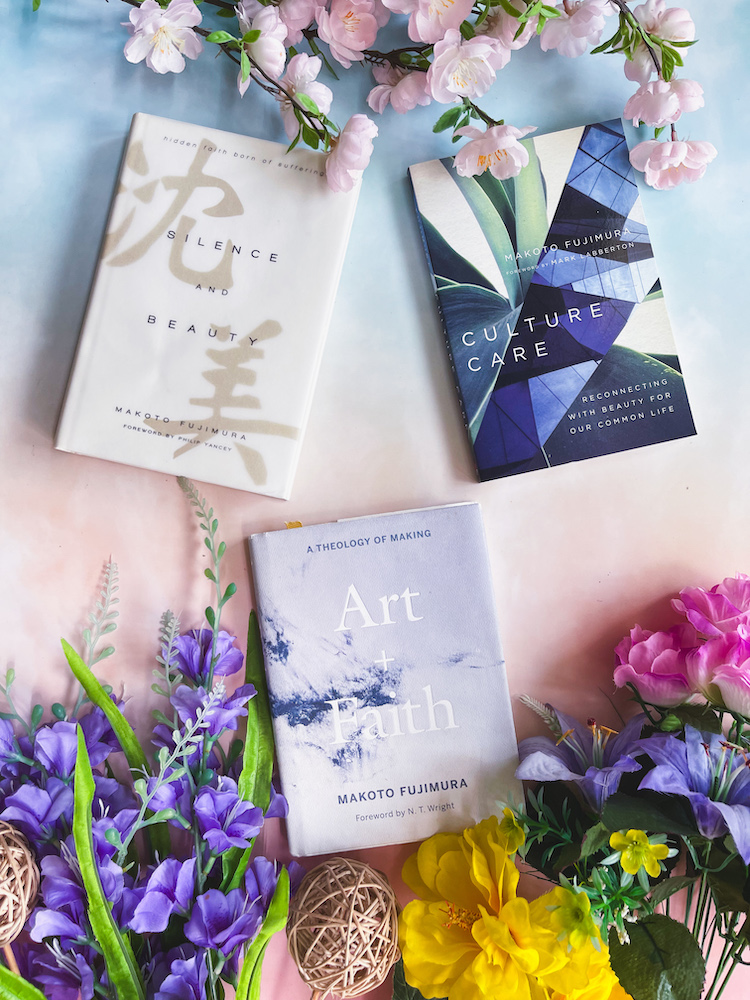Lately, I’ve been immersing myself in Makoto Fujimura’s books. I mean, I have a really really long TBR list (probably everyone here knows that) but I reread Silence and Beauty a month after I finishing it because the books have just had that much of an impact on me.
As you also know, I’ve been taking it easy on the blog this year. I think it’s because now that I’ve kinda given up on writing fiction, I’ve also been questioning what my online presence is for. This is where I find Fujimura’s books so timely, because of their encouragement to engage with the world and to create things of beauty.

Art + Faith
This is the book that started it all. In a way, I’m glad I read this after I read Liturgy of the Ordinary and How to Inhabit Time, because I was primed by those books to think more holistically about my faith. And that’s why the following quote hit me hard:
“To what purpose, we ask, are we making? If the answer to that question is “we make to be useful”, then we will value only what is most efficient, what is practical and industrial. The thesis that undergirds the entire culture care project, and the Theology of Making, is an antidote to such utilitarian pragmatism: the essence of humanity under God is not just utility and practical applications: the essence of humanity may be in what we deem to be “use-less” (to use the hyphen in the Dickinsonian way) but essential. The deepest realm of knowledge is in Making and, conversely, Making is the deepest integrated realm of knowing.”
Why do I make blogposts? Why do I make books? In a way, I’ve forgotten my first love, which was writing for the sheer joy of it. The first thing I ever wrote and self-published was done because I had an idea, I was deeply interested in whether I could execute it, then I was deeply interested in the editing process, and so on and so forth until I had self-published it. It was only after I started worrying about writing in a series and sell-through rates that writing started become a slog.
It’s only after I started reading about side hustles and being productive all the time that I started thinking about blogging on a schedule instead of when the mood hit me. And though intellectually, I could see that all I wanted was for this blog to be a hobby, the pressure to be good and to be professional (and the accompanying thought that I’d never be good enough) turned this into another form of pressure as well.
***
“Christians are seen in culture as promoting hatred instead of love, vindictiveness instead of joy, vilification instead of peace, alarmism instead of patience, discord instead of kindness, racism instead of goodness, prosperity instead of faithfulness, and the imposition of power instead of self-control. We need only to look at ourselves in the mirror to see that our witness has not produced the fruit of the Spirit in the culture at large; instead, we have withdrawn into our fear-filled shells. So how we learn, and how we teach, matters to produce the good fruit that God has in store for us.”
While I’ve not (or least I hope not) promoted very negative attributes here, I do know that I sometimes have an abrasive personality (this is especially so on other platforms!) and this quote was a reminder that abrasiveness is a turnoff to everyone.
Culture Care
In Culture Care, which covers more of the practicalities of what the term means, Fujimura writes that:
“Beauty is the quality connected with those things that are in themselves appealing and desirable. Beautiful things are a delight to the sense, a pleasure to the mind, and a refreshment for the spirit. Beauty invites us in, capturing our attention and making us want to linger. Beautiful things are worth our scrutiny, rewarding to contemplate, deserving of pursuit. They inspire – or even demand – a response, whether sharing them in community or acting to extend their beauty into other sphere.”
I don’t know if what I write here is considered beautiful because… I’ll look at some of my short essays and think that it can still be improved but this does make me want to improve my writing and try to create something that I can be proud of sharing.
Another concept from Culture Care that I’ve been chewing over is Fujimura’s three pillars of a movement. To start a movement, one needs:
- An artist type with creative capital
- A pastor or community organiser type with social capital
- A business type with access to material capital
I would honestly love to be type 1, the artist type, but now I’m wondering if I’m more of a type 3 (due to the nature of my job) and if this is a sign to seek out more artistic people so I can support them as they create beautiful things.
Silence and Beauty
Last but definitely not least is Silence and Beauty, Fujimura’s response to Endo Shusaku’s work: Silence (which is probably THE book that led me to study in Japan). Here, Fujimura argues that Japan is a Christ-haunted culture, but also a fumie-culture and explores what those two terms mean.
“What Japan offers that no other culture can offer is the integration of nature with culture, and the distinct reality of 美 (kanji for “beauty”). 美 is also a hidden gospel, a good spell to liberate us from the curses of our past, our current Ground Zero conditions.”
I recently wrote about Japanese aesthetics and how I understood them. Silence and Beauty gave me a fresh take on them and made me think that I might not be done with learning and talking about Japanese culture, even if I no longer live there.
***
“To make our way forward is to go back in history. To recover past trauma is to awaken to the pain, and we cannot heal until we see the narratives of the past renewed by faith and hope.”
I wanted to end with this quote because time and the past seems to come up a lot in what I’ve been reading (or rather, what I read and liked) and I wonder if it’s a sign that I need to be reflecting more on the past in order to discover what I want to do in the future. In fact, this quote from Silence and Beauty reminded me of the following quote from How to Inhabit Time:
“Our past is not what we’ve left behind; it’s what we carry. It’s like we’ve been handed a massive ring of jangling keys. Some of them unlock possible futures. Some of them have enchained our neighbors. We are thrown into the situation of trying to discern which is which. We are called to live forward, given our history, bearing both its possibilities and its entanglements. Faithfulness is not loyalty to a past but answering a call to shalom given (and despite) our past.”
How to Inhabit Time by K.A. Smith, Chapter 1

Thank you for that. Timely and thought provoking. Also explains why I haven’t seen much of your work recently (although I’ve also been awful at keeping up with blogs).
A thought on something you said – “this quote was a reminder that abrasiveness is a turnoff to everyone.”
I think an awful lot of people are attracted to abrasive personalities. Think of how popular antiheroes are, or edgy comedians, or people who talk loud and angry at other communities. Abrasive personalities come across as witty, as champions, as honest, and so on…
… until you’re on the wrong side of the abrasiveness.
Abrasiveness gets people ahead in their communities, but sharpens divides between their community and other ones. Which doesn’t mean it doesn’t have its time and place. Just not as many as some believe in.
In terms of spreading beauty and love through the world, I think recognising the appeal and value of being abrasive is necessary for being able to sidestep it.
I’ve been awful with keeping up with blogs too! But thank you for the good point about abrasiveness, we seem to enjoy following awful personalities for some reason! I’ll have to think about that a little more and how abrasive/non-abrasive I should be!
I’ve gotta agree with Peat about folks being attracted to abrasive personalities. I have a few such people in my fam, and people are often drawn to them because of their honesty. However, I know it can be a little off-putting at first, esp for people who weren’t expecting such directness and honesty, but I find that they quickly get over it.
Thanks, Zeezee! I’ve had a lot of comments about me being “too scary” because I lean on the direct side (esp during my time in Japan) so I can see the downsides pretty fast, the upside… not as quickly haha
Great post! I’m glad that these reads helped you reflect on your own intention and purpose for your writing. All I know is that honesty is the best policy. With experience, we learn to share raw thoughts with more efficiency, which some people will think is abrasive when it isn’t really. 😉
Thanks so much, Lashaan. I find that I’m more circumspect with how much personal info I put out as I get older, but I’m definitely aiming to be honest with what I put out on the internet!
Rereading not long after the first read is always the highest compliment!!! It sounds like this author is pretty much perfect for you!
Yes, he is! Or at least, his books came at the perfect timing for me.